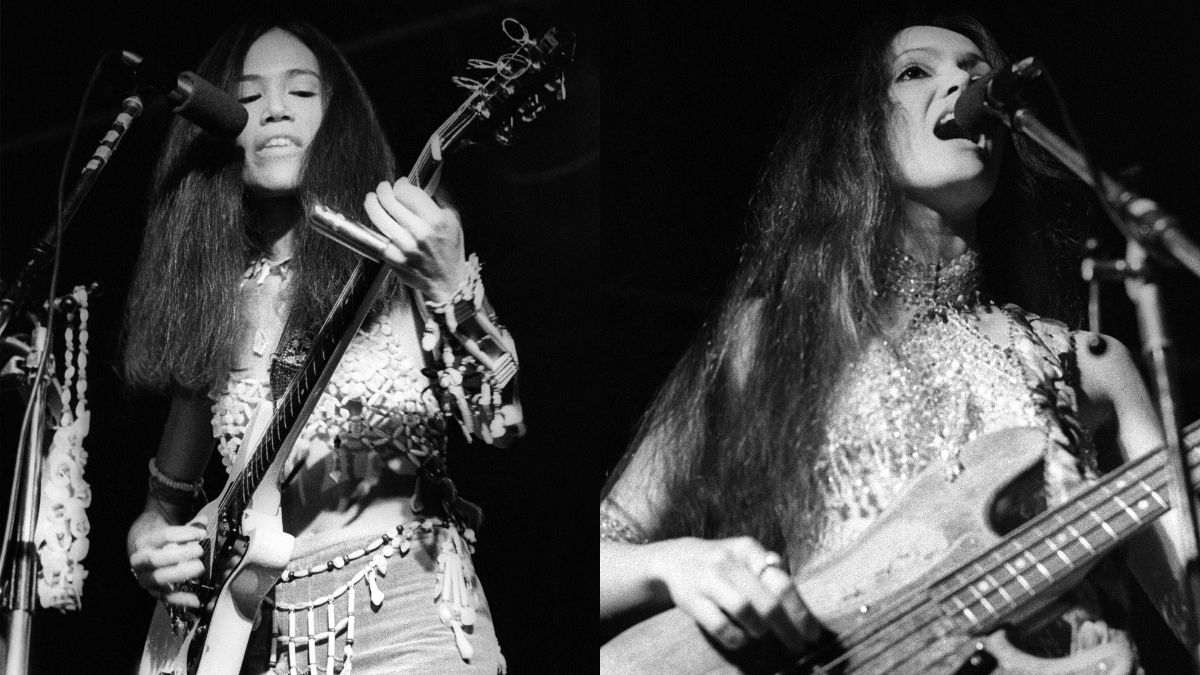Richie Faulkner: ”Judas Priest came from a place of progressive blues. The seeds of metal were sewn through the blues – that's the true heritage of heavy metal”
Currently flexing his bluesier chops with metal supergroup Elegant Weapons, Faulkner reflects on how his recent heart surgery gave him a new lease on life, and why his forthcoming signature Gibson V will be ”the most metal-sounding guitar you've ever heard”
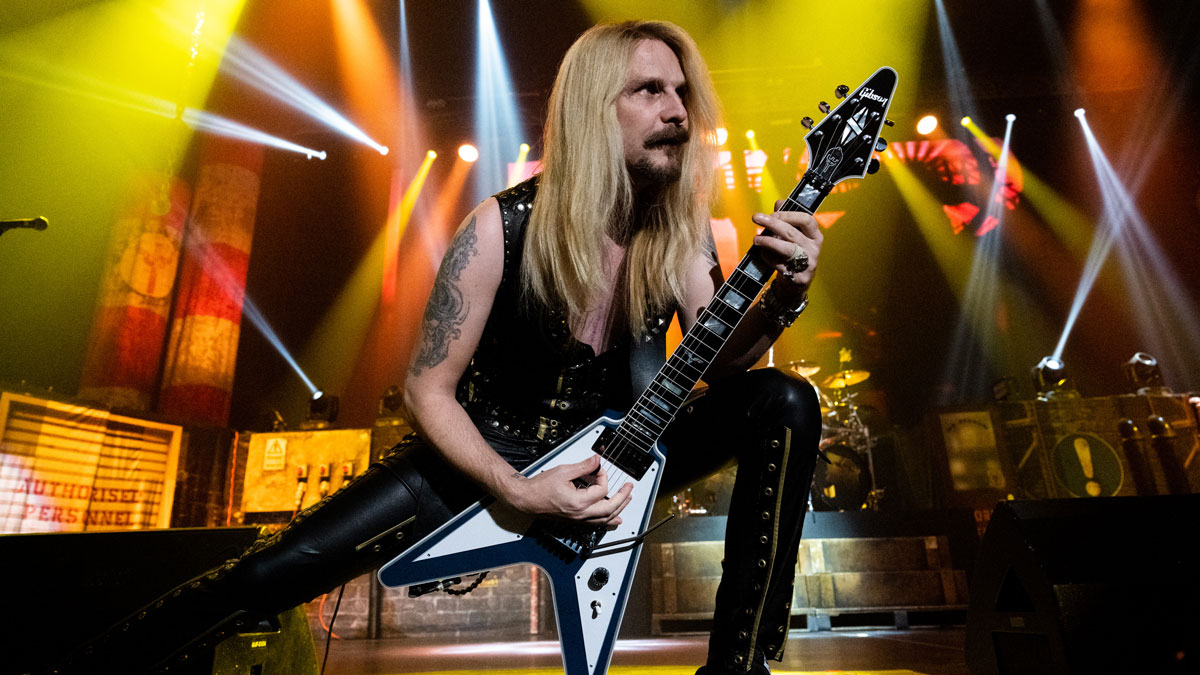
All the latest guitar news, interviews, lessons, reviews, deals and more, direct to your inbox!
You are now subscribed
Your newsletter sign-up was successful
When Richie Faulkner stepped in for legendary metal shredder K.K. Downing in 2011, he couldn't have possibly known what was in store for him. And he certainly couldn't have imagined that 12 years later, he'd still be holding down the fort as one of Judas Priest's two lead guitarists.
“When I first joined Priest, they were at a point in their career where it would be their last tour,” Faulkner tells Guitar World. “And I remember having a conversation with Glenn Tipton when I joined the band about the fact that Judas Priest weren't going to be around in 20 years [Laughs]. Fortunately, that was 12 years ago, and Priest is still rockin' and rollin'. But when I replaced K.K Downing, that wasn't the plan. And since then, it's always been on my mind that I'm going to have to do something after Priest.”
While Faulkner might not have been able to fathom the task ahead, with blonde locks, a leather-clad frame, and hyper-charged licks for days, he sure did his best to make the heavy metal faithful forget K.K. Downing.
Then there's the matter of his first tour being intended to be Priest's last. If we look back, when Downing departed, most thought Priest akin to a zombie stumbling toward its grave. But with Faulkner on board, the veteran band felt re-energized, as evidenced by continued touring and some of the finest studio material they've summoned since their late '70s and '80s heyday.
Impressive as he's been for Priest, Faulkner was a young man amongst a legacy act's ranks. And if we fast forward to the present day, at 43 years of age, time is still on his side. Sure, he's logged more miles than many his age could possibly dream of, but if you were to ask Richie Faulkner, his most creative roads have yet to be traversed.
“I think that anything I've ever done – even before Priest – has always had the same mindset,” Faulkner says. “It's about doing what I'm doing and putting my stamp on it until I'm doing something else, something happens, or whatever it might be. Even if I had never been a part of Priest, I still would have been doing the same thing.
“I'd be playing in cover bands on the weekend, and I'd be working to get my own band off the ground,” Faulkner continues. “That's what's in my DNA. That's what I'm programmed to do. This is no different, you know? If Judas Priest hang it up and retire, this is what I will be doing. I didn't put Elegant Weapons together to be experimental – I put this together to be my band going forward.”
All the latest guitar news, interviews, lessons, reviews, deals and more, direct to your inbox!
Having survived a sudden heart surgery, along with the knowledge that Judas Priest's time in the sun is ending, Faulkner is looking ahead. Be it through the “privilege of putting together a signature guitar” or the rewarding nature of making music he can call his own, the veteran guitarist is prepared to grab life by the horns and take what comes his way with grit and grace.
In support of Elegant Weapons' hard-hitting debut LP, Horns for a Halo, Richie Faulkner dialed in with Guitar World to discuss the influence of the blues on his riffing and soloing, stepping out of the shadow of K.K. Downing, the latest on his signature Gibson Flying V, and how his heart surgery affected his outlook on life.
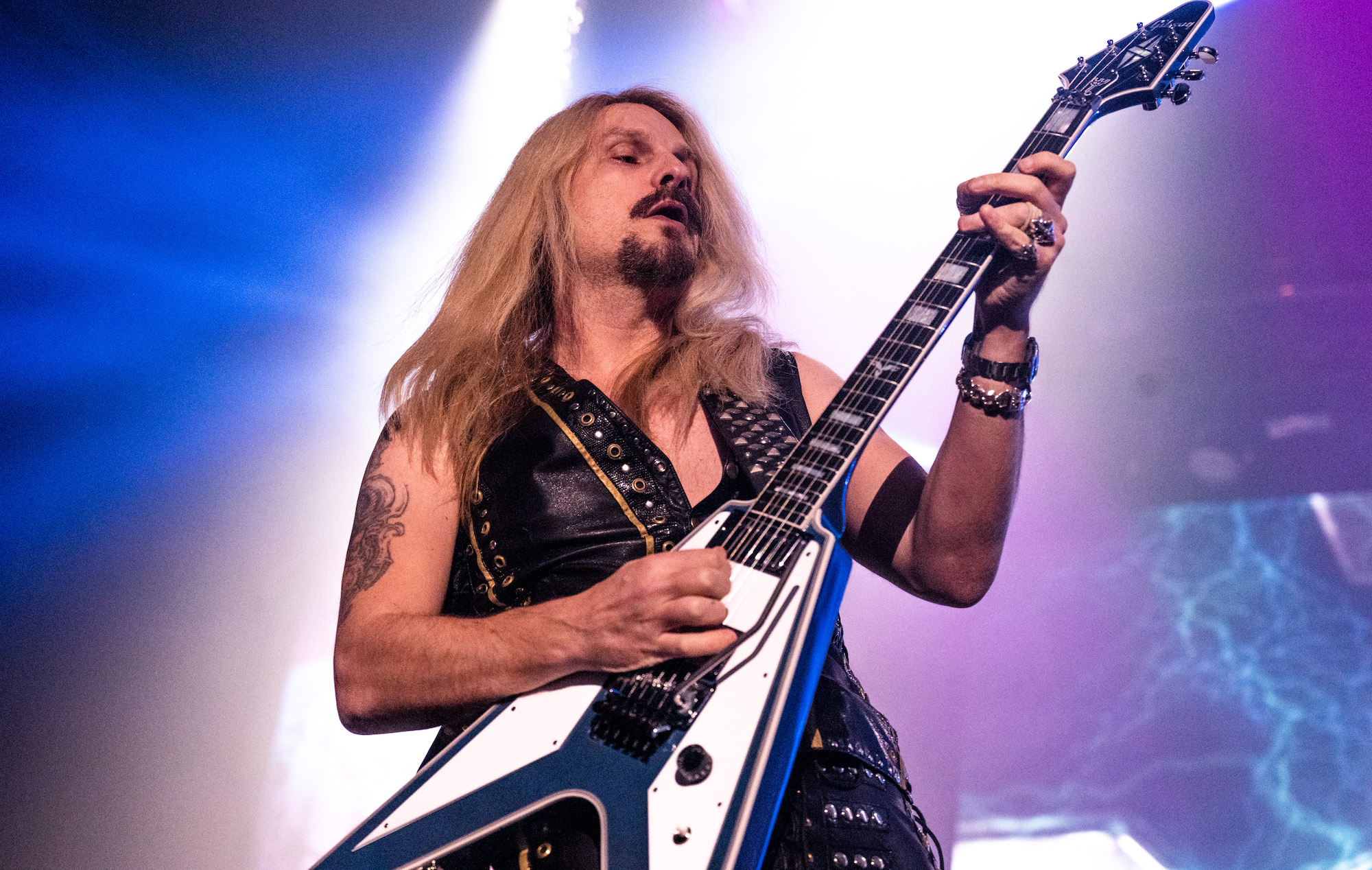
Tell me about how Elegant Weapons came together.
“It's always been a conscious thing for me to think about my life after Judas Priest. I was always putting stuff down and writing songs, riffs, melodies and ideas. So, Elegant Weapons is a collection of songs I have put together over the years since I joined Priest. But what really got the whole thing focused was the COVID lockdowns and being unable to tour.
“Priest finally had some time where we weren't touring, and the Priest record had already been written, so this was a chance for me to finally focus on getting these ideas together and see what I had. I had to find out if this was an EP, a one-time album, or a full band. And I fully believe it's a band.”
How did the outlook of Horns for a Halo being the start of your life after Priest aid in shaping these songs?
“In many ways, it was the same sort of process that I use when I'm writing for Priest. I don't put on a different hat when doing Elegant Weapons or anything like that. This style of music is what comes naturally to me. But I think it's got a different character than the Priest stuff I've done.
“I think it's a bit more bluesy than the heavy metal stylings of Judas Priest, and that's where Elegant Weapons really stand on their own two feet. And ironically, early Priest was more progressive blues than heavy metal, and I think Elegant Weapons have a lot of that going on.”
Does your songwriting and guitar style naturally lean more bluesy, then?
“I think so. You'll hear more Hendrix, Black Sabbath, and early Priest with this stuff. But still, it was the same kind of process that I go through with Priest, where I sit down, strap the guitar on, flick on the amps, and see what comes out. I'm a riff and melody guy, first and foremost. I just start playing and see what comes out, and then I'll try and put a song around that.
“I guess I'm saying that the riffs and melodies come first, rather than the lyrics. And that's how a lot of Horns for a Halo came about. I'm always putting things down. If I go and put something down this afternoon, you never know – it might end up on an album a few years from now. You never know when a good riff will be needed, so it's best to bank them as you can.”
To my ears, those blues influences are most present in your phrasing and less so in your tone. Would you agree?
“I would say so. You know… what I think as a guitar player and what I pick up as part of my playing is usually totally different from how the listener perceives it. And that's fantastic. But in this instance, I believe you're right.
“When people think of my playing, they often hear Zakk Wylde, Michael Schenker, and Dave Murray, which are more metal, I would say. And then, as you said, you've picked up on the blues phrasing, which is great. But by and large, the listener always picks up something different from the player. I think there's beauty in that.
“I grew up with the blues a lot, and I was always a massive Hendrix nut rooted in the blues, too. And a lot of heavy metal was born from the blues, and, as I said earlier, Priest came from a place of progressive blues. So, the seeds of metal were sewn through the blues – that's the true heritage of heavy metal. It's all connected, and I draw from both influences. The blues is a massive part of my playing and always will be. I still go back to Hendrix for inspiration and take from the heavy metal pile, too.”
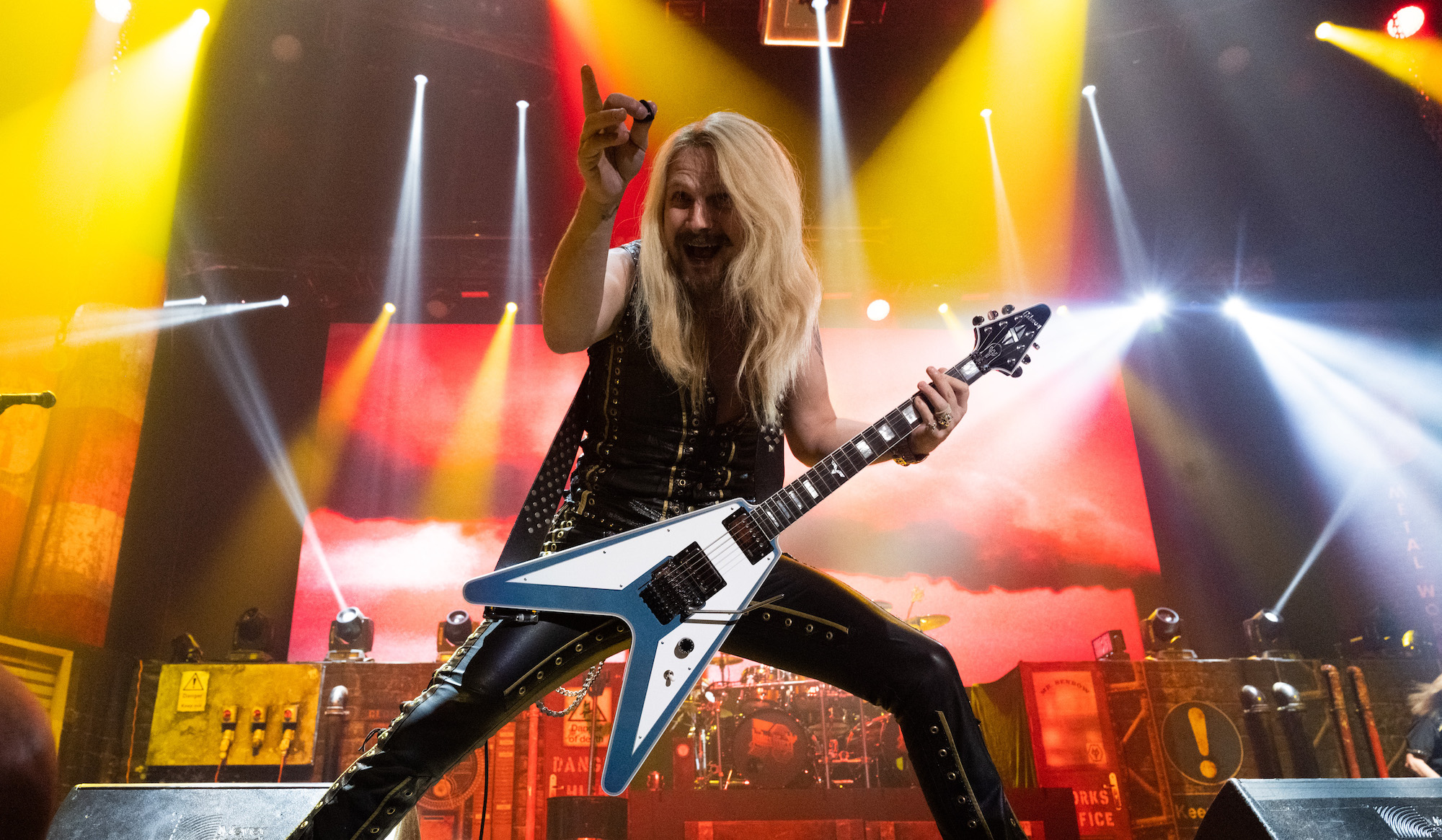
Did you bounce any of your ideas off Rob [Halford] or Glenn [Tipton]?
“I showed Rob a few of the songs once they were nearly completed. But in terms of asking for guidance or, as you said, bouncing ideas off them, I didn't do that. The first time they heard them was after I'd completed them.
“This was really something that I wanted to do as my own thing. And at the time, the Priest record that we were writing was done, so I could fully draw a line in the sand between the two and focus on my record.
“For the first time, I could throw all my new ideas into this project, which made all the difference. But I will say that once I showed Rob, he was interested and wanted to hear more when it was done. And when I showed him later, Rob really dug it. But apart from that, when it comes to creative input, Elegant Weapons is entirely my own thing.”
How does working with Ronnie Romero compare to working with Rob?
“All the music was written before Ronnie came on board, so it was different in that respect. With the Priest stuff, and all the songs I've written with them, the music was written while Rob wrote the lyrics. But, hopefully, as we begin working on the next Elegant Weapons album, Ronnie will be a big part of the process.
“That aside, Ronnie was obviously the perfect guy for the job. For me, it was a no-brainer that Ronnie was the right guy. It was just whether he wanted to do it or not. Fortunately, he did. As soon as I called him up and showed him the music, he totally got it. It also helps that we come from legacy bands and have that shared mindset. Ronnie plays with Rainbow and Michael Schenker, so his philosophy is the same.
“We both know that the older guys aren't going to be around forever, so we have to do what we need to do to carry the torch and the DNA of these classic bands forward toward the next generation. Hopefully, what happens is that the band grows and evolves together to create something greater than the sum of its parts.”
Do you have a favorite guitar solo from Horns for a Halo?
“That's a good question. I think one of my favorites is [on] a song called Bitter Pill. It's a very simple guitar solo, but it's one of those solos that suits the song, you know what I mean? It's not a technical assault solo, and it's not a flash guitar solo, but it suits the song perfectly. I like solos where you can almost sing them, and the solo for Bitter Pill is like that.”
Which solo proved to be the most challenging for you to execute?
“There's a song called Do or Die, which was quite challenging. It's a fast song, like a rip-roaring ride. It's a quick song, and there are some fast guitar parts in there, which is always a challenge. But I like a challenge. As a guitar player, it's always fun to play challenging parts. And Do or Die was a bit of a challenge for sure.”
Considering you replaced K.K. Downing, I'd wager you're used to challenges.
”That's for sure! The interesting thing about taking over for K.K. was that I was playing all his solos and songs. I was playing them his way, or, at least, in a way that was very similar to how people remember them. But when I play my own guitar solos, both in Priest and Elegant Weapons, it's about me thinking, 'What am I going to say as a guitar player?'
”That's the challenge, rather than the literal technicality of it all. I am constantly trying to decide what I want to say with my guitar that's going to be memorable or how I'm going to leave my fingerprint on things.”
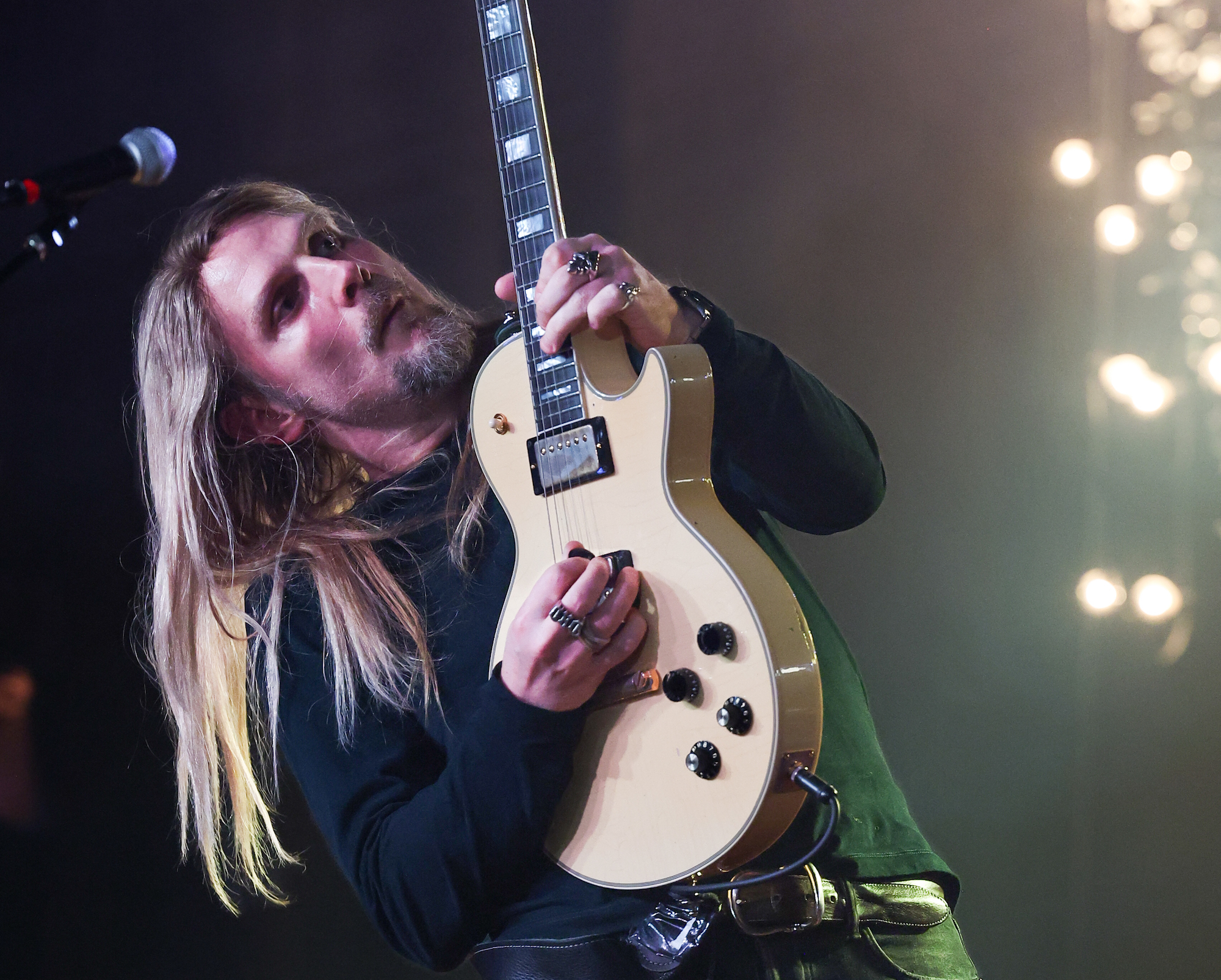
What combination of pedals and amps did you deploy on Horns for a Halo?
”It's a bit of a boring answer: one guitar, one amplifier, and no pedals. I stuck with a direct approach – I had a guitar that I loved and an amp sound that was perfect. That was it, that was all I needed. Any effects like delay or reverb came about during post-production and were handled at the desk by Andy Sneap. But the amp I used was like a Marshall Plexi, and I only used one channel. It's a famous amp we all know and love and with good reason. It does that thing we all know, and it does it very well.
”As far as the guitar that I used, it's my signature model that I've been working on with Gibson. I love that guitar. It ticked all the boxes and did everything that I needed it to do during the album. I considered using a few other guitars, but there was no need at the end of the day. I thought to myself, 'Why bother? I don't need another guitar.'
”That guitar, along with a very direct approach through the Plexi, made sense for this record. It might be different on another record, but I took that approach on this one.”
You mentioned your signature Gibson Flying V, which you've referred to as ”the most metal-sounding guitar you've ever heard”. Can you expand on that?
I play in one of the world's most legendary heavy metal bands, and my Flying V handles that music quite well
”I think maybe I was trying to be a bit funny with that line [Laughs]. But obviously, I play in one of the world's most legendary heavy metal bands, and my Flying V handles that music quite well. I see it as a classic Flying V design, really. But it's got some appointments that I've used and expanded on over the years, like active EMG pickups. But, my signature guitar is very stripped down in many senses. Instead of multiple volume and tone knobs, it's set up with one volume knob and one pickup selector.
”It's got a Floyd Rose, which is essential to what I'm doing. So, it's stripped down in some senses, but in others, it's got some deluxe appointments. I've had my guitar set up this way since I joined Priest, and in that time, it's taken on some appointments over the years in the guitar that we're releasing today. It's been out on the road with me for the last few years, and it's on the new Priest record. It's very much part of who I am today as a guitar player. It's a special guitar to me.”
Why do you prefer a stripped-down guitar as opposed to a hot-rodded one?
”For me, it's about taking away the things that I don't need. It's a blessing to have the opportunity to be able to modify my instrument to my liking. So, if there's something on my guitar that I feel I don't need, I either take it off or modify it into something that I do need.
”I wasn't using the tone controls or the extra volume knob, so I took them off. But as I said, I felt I needed the Floyd Rose to do what I do, so I added one. Being fortunate enough to take liberties in changing and modifying my guitars for my own use and to present them to others as a signature model has been a blessing. I'm very thankful for it.”
With Horns for a Halo in the can, what's your outlook as you move forward?
It was essential for me to look ahead with Elegant Weapons. I didn't want to be a band that makes one album and then fades into obscurity
”I love playing live and look forward to playing these songs live. I think the true evolution of a band happens when you play live, the songs evolve when you play live, and the relationship between band members evolves. That's where you grow as a band and, as I said before, become something greater than the sum of your parts. I want the characters in the band to become one unique character that changes, evolves, and grows as we look to the future.
”It was essential for me to look ahead with Elegant Weapons. I didn't want to be a band that makes one album and then fades into obscurity. I want to release many albums, grow, and play live and tour. And that's what excites me most. The idea of this band growing and evolving over the years, from album to album, is enticing. I have no idea what will happen or how the style of what we'll do will be influenced, but that evolution is what I'm looking forward to the most.”
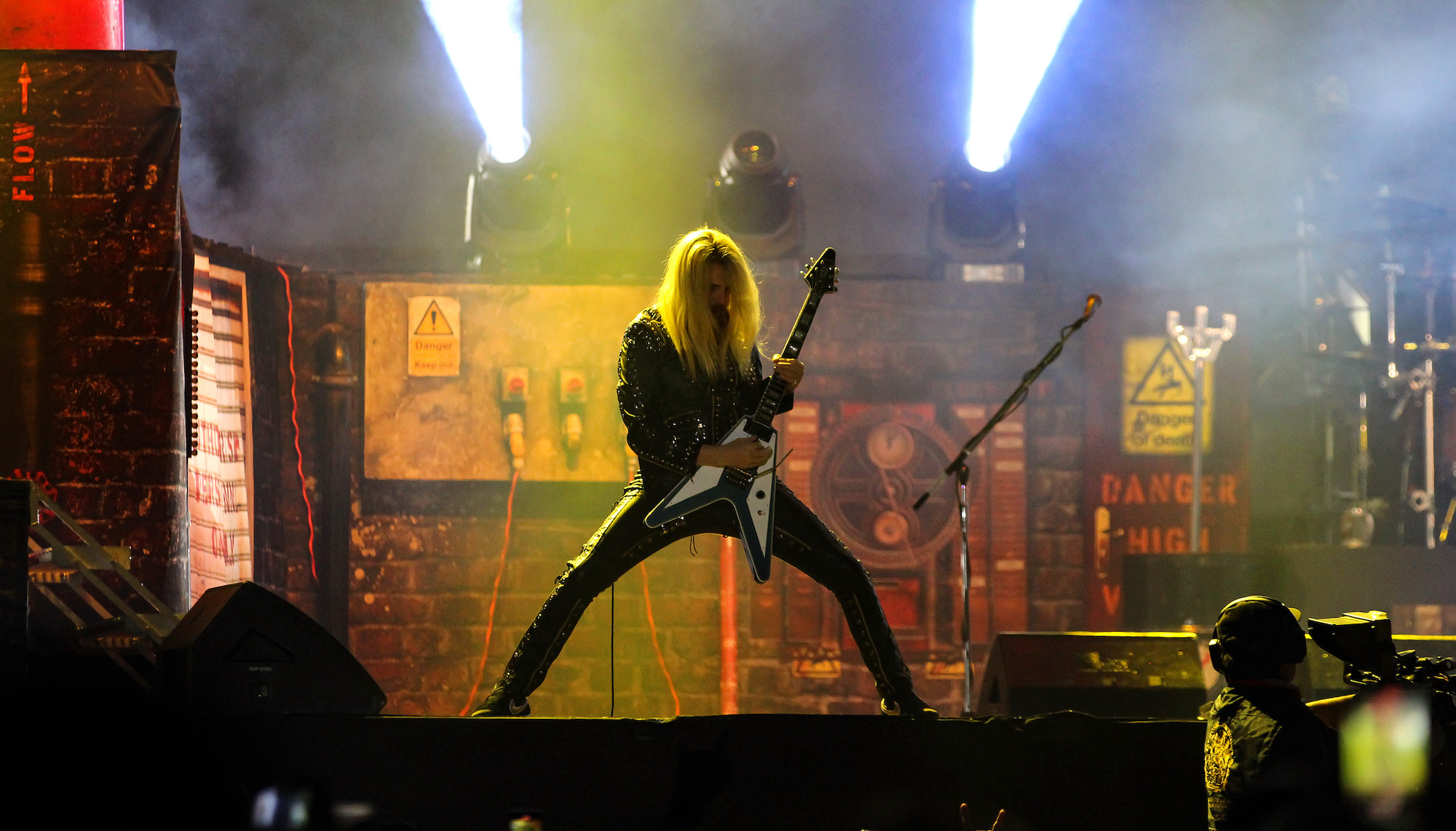
How did your sudden emergency surgery alter your perspective on music and life?
”It made me think that if there's anything I need to do, I better do it. If there's a book to write, something to say, or an album to write, I realized that I better get out and do it. There's no time like the present, because the reality we all face is that we might not be here tomorrow.
”I know that's a bit of a dramatic thing to say, but nothing in life is promised. And in my case, when it happened, I was only 41 years old. I was healthy, and surely, I thought, everything was fine. So, you never know what's around the corner.
”So, when it happened, that's when all that hit me. I realized I needed to get out and do what I wanted to do to the best of my ability. It's not a new philosophy by any means – it's been said before, and here I am, saying it again. But the thing is, all of that became very real to me, and it was a major motivator and a sort of medicine for me when it happened.
”Getting back out with Priest, making the new Priest album, and doing Elegant Weapons were all medicine for me. It focused me on returning to being who I am and doing what I do. I'm glad I'm still here to be able to do that, and I plan to continue doing it for as long as I can.”
- Horns for a Halo is out now via Nuclear Blast.
Andrew Daly is an iced-coffee-addicted, oddball Telecaster-playing, alfredo pasta-loving journalist from Long Island, NY, who, in addition to being a contributing writer for Guitar World, scribes for Bass Player, Guitar Player, Guitarist, and MusicRadar. Andrew has interviewed favorites like Ace Frehley, Johnny Marr, Vito Bratta, Bruce Kulick, Joe Perry, Brad Whitford, Tom Morello, Rich Robinson, and Paul Stanley, while his all-time favorite (rhythm player), Keith Richards, continues to elude him.

